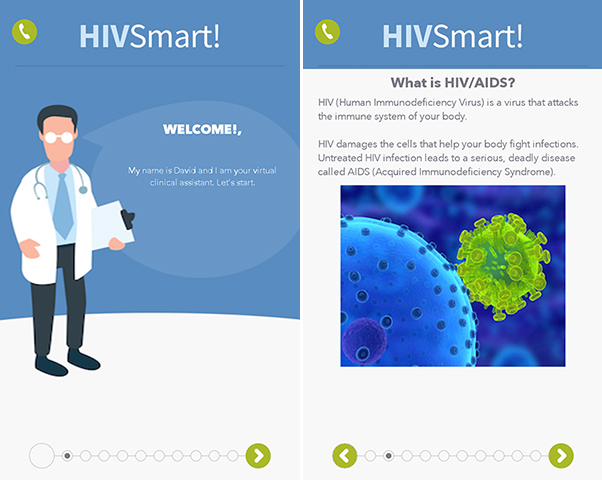
Breadcrumb
- News and Events
- News
- Content
- App-based HIV self-testing program leads to rapid detection of new infections and efficient connection to care
null App-based HIV self-testing program leads to rapid detection of new infections and efficient connection to care
A unique new study shows that self-testing with the HIVSmart! program can successfully link users to antiretroviral treatment and preventative care
Montreal, September 2, 2021 - In the shadow of the COVID-19 pandemic, HIV continues to be a major global public health issue, affecting an estimated 40 million people. But as COVID-19 disrupts healthcare systems, digital health initiatives are stepping in to fill the gap, offering the possibility to increase access to effective HIV prevention, diagnosis, treatment and care.
Implemented in township populations of Western Cape in South Africa with the collaboration of physicians at the University of Cape Town and community healthcare workers, the app-based personalized HIV self-test (HIVST) program HIVSmart! developed by Dr. Nitika Pant Pai at the Research Institute of the McGill University Health Centre (RI-MUHC) not only successfully linked participants to counselling services and care, but also detected new infections and increased referrals to self-test. These findings suggest that self-testing strategies using innovative digital technologies that provide access to care could accelerate progress towards UNAIDS targets for HIV elimination worldwide. The study that compared this HIVST program to conventional HIV testing was published this month in BMJ Global Health online.

Recent HIVST studies have shown increases in self-test uptake and detection of new HIV infections. However, without the appropriate programs and logistics, linking people to either preventative care (i.e., pre-exposure prophylaxis, partner notification and medical circumcision) or treatment care has remained a challenge.
“The WHO has called for evidence for the use of digital supports and community-based healthcare workers to improve services associated with HIV self-testing,” explains Dr. Pant Pai, physician and scientist in the Infectious Diseases and Immunity in Global Health Program at the RI-MUHC and first author of the publication. “Our study shows that a flexible, anonymized, secure, app-based digital program can be successfully deployed with young digitally savvy populations, even in low-resource settings.”
Self-testing: an attractive and practical solution for hard-to-reach populations
In this quasi-randomized trial, participants were given the choice between the oral self-testing program with digital supports (HIVSmart!) and conventional HIV testing. A total of 3,095 consenting adults were recruited from geographically dispersed clinics over an 18-month period.
Almost all (99.7%) participants in the HIVST group were linked to antiretroviral treatment initiation or preventative care pathways through the HIVSmart! program. More new HIV infections were detected within the self-testing group than in the conventional testing group (9% vs. 6.8%). Additionally, at-risk people, for instance those having sex with multiple partners, were more prevalent in the self-testing group.

Increasing referrals to self-testing
The study documented 5.5 times more referrals to friends and partners in the self-testing group. Though self-testers who participated in the program were predominantly young women, researchers observed that women actively recruited young men through the app. “We concur that women could be the change agents for HIVST—by encouraging men within their social network to self-test with a digital program,” note the authors of the study.
“Our personalized program allowed us to explore people’s preferences for digital HIV self-testing. The study revealed how effective this program is and how it could be scaled-up to reach more people,” adds Dr. Pant Pai, who is also an Associate Professor in the Department of Medicine at McGill University. “It was very interesting to see that some people who opted for self-testing were leading riskier lives. We were happy to have reached those people who would have never gotten tested for HIV.”
“The advent of COVID-19 has reduced access to healthcare services. This, combined with the fact that more than half of new HIV infections in many African countries are in the young tech-savvy population (15 to 30-year age group), means that HIV self-testing with digital support tools will fill a huge unmet need and improve detection rates and links to care,” adds co-principal investigator Dr. Keertan Dheda, Director of the Centre for Lung Infection and Immunity at University of Cape Town in South Africa and Professor of Mycobacteriology and Global Health London School of Hygiene and Tropical Medicine in the UK.
“HIV and AIDS affect millions worldwide, and knowing you have it can certainly help prevent its transmission. Dr. Pant Pai’s work is an essential step toward reducing and eliminating HIV transmission—one that will improve and save countless lives. I am grateful to our community of donors for supporting this important initiative,” says Julie Quenneville, President and CEO of the MUHC Foundation.
About the study
The study Impact of a personalised, digital, HIV self-testing app-based program on linkages and new infections in the township populations of South Africa was conducted by Nitika Pant Pai, Aliasgar Esmail, Paramita Saha Chaudhuri,Suzette Oelofse, Marietjie Pretorius, Gayatri Marathe, Jana Daher, Megan Smallwood, Nicolaos Karatzas, Mohammed Fadul, Anna de Waal, Nora Engel, Alice Anne Zwerling and Keertan Dheda.
DOI: 10.1136/bmjgh-2021-006032
Funding acknowledgment
This study was made possible thanks to Grand Challenges Canada Transition to Scale Award (Government of Canada), Medical Research Council South Africa (MRC SHIP) Department of Science & Technology South Africa (Government of South Africa), the MUHC Foundation and OraSure technologies kit support.
About HIVSmart!
HIVSmart! is an award-winning smartphone application that allows self-testing for HIV. Available for smartphone, tablet or web-based (Android, iPhone, and iPad) this software app was developed by Dr. Pant Pai and her team at the RI-MUHC with funding from Grand Challenges Canada. It informs, interprets and stores data confidentially but, most importantly, it links users to counselling or care quickly and encourages the user to stay in care.
Media contact
Fabienne Landry
Communications coordinator, Research
McGill University Health Centre
Fabienne.landry [at] muhc.mcgill.ca
Cell: 514 812-7722